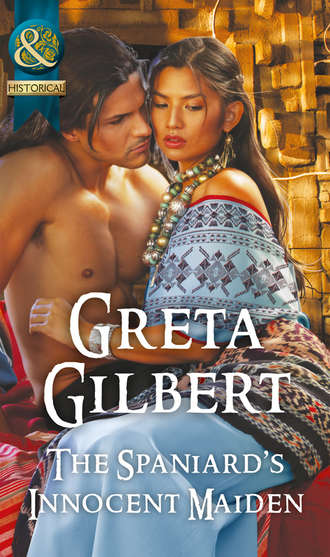
Полная версия
The Spaniard's Innocent Maiden
My Dear Benicio,
I love you, but I must take care to marry well. Seek a fortune. I will wait for you as long as I can.
Your Luisa
Benicio’s heart overflowed. There it was, written in her own hand: her answer to his proposal. She loved him as he loved her. She would wait for him and become his wife. All she required was a bit of wealth, to keep her in the lifestyle she wanted. The lifestyle she deserved.
Benicio looked up and saw the old captain, still there, still waiting at the other end of the plaza. He might have been the Devil himself, considering whether or not to take Benicio’s soul.
Benicio began to walk towards him, letting his book of formulas drop upon the ground. Benicio was a man, after all, and the purpose of a man was not to sit at a desk, but to seek a fortune. To make himself worthy of the woman he loved.
Luisa, I promise, he murmured.
He caught the captain’s eye. The old man flashed Benicio a knowing grin.
Chapter One
Cempoala City, Totonac Territory,
Mexican Empire—March 1519
Tula was not afraid of the dark. She was not afraid of the spirits that lurked in the shadows, whispering their complaints. The darkness was good; it concealed her. It wrapped around her like a magic cloak, letting her pass unseen to the places where she kept her secrets.
Even now, as she walked softly between the mats of her sleeping family members, she felt no need for the aid of light. The warmth of their breath told her where to place her feet and she could feel the fresh air that seeped through the front doorway, beckoning her.
She pushed open the thin wooden door and closed it gently behind her, stepping out into Cempoala’s central plaza. She scanned the sprawling space for movement. Not a single living thing stirred beneath the moonless sky and the darkness of night greeted her like a trusted friend. No, Tula did not fear the dark.
What Tula feared was the colour black. Black was the colour of the Tribute Takers’ hair. They wore it pulled back, tight to their skulls, and trapped it in buns at the bases of their necks. They lived in a great floating city high in the mountains, where their leader, Montezuma, whispered to the gods.
Black was the colour of the ink on the scrolls the Takers carried—long lists noting the tribute the Totonac people were required to provide every eighty days: four pots of vanilla, twenty-eight bins of maize, twenty-one bins of smoked fish, two thousand feathers, four thousand cotton cloaks.
Black was the colour of the mushrooms the Takers ate—mushrooms that gave them visions of the end of the world. A menace from the heavens was coming, they told the Totonacs, and it could only be prevented with the blood of sacrifice.
Totonac blood.
Tula walked around her stone house and into the garden behind it. She dug beneath the tomato plants and found her stash of spears and arrows. Digging deeper, she seized her atlatl, which would send those arrows to their marks. She had killed so many creatures in her lifetime—far too many than was good or right. But the Takers demanded meat, more and more of it, and the Takers had to be fed. She ran her finger softly across the sharp, obsidian blades.
They, too, were black.
‘Daughter?’ whispered her father’s voice.
‘Father?’
The shadowy figure of her father appeared in the back doorway. ‘Why do you rise in the useless hours? Where do you go?’
‘I go to catch the fish, Father, and the birds. Coalingas and macaws. Perhaps even a quetzal.’
‘Nahuatl. Speak to me in Nahuatl.’
Tula sighed. ‘I go to find the...the...swimming creatures...’ she faltered ‘...and the flying creatures.’ Of all the languages her father had taught her, Tula liked Nahuatl the least. It was the language of the Mexica, the language of their oppressors, yet her father would not speak to her in any other tongue.
‘Why do you not wait for the Sun God to be reborn?’ he asked her, pointing at the eastern horizon.
‘I do not wait because the swimmers do not wait,’ she lied.
‘You rush to find fish, but you delay finding a husband.’
‘Why seek a husband if he is doomed to die?’ She bit her tongue. She had spoken too quickly and too loudly. Her father bent his neck inside the house, listening for her elder sister, Pulhko, who slept lightly and without rest. Satisfied with the unbroken peace, he shook his head. ‘Your sister Pulhko will remarry as soon as she is well,’ said her father.
But she will never be well, thought Tula, saying nothing.
‘And your sister Xanca seeks a husband already.’
‘Xanca is young and her head is full of colours. She knows little of the cruelty of the world.’
Her father did not respond and she knew that it was because he agreed. Xanca was not old enough to remember when Pulhko’s husband and two boys were taken. Nor had Xanca been instructed in the history of the world, as Tula had been. As a result, Xanca’s spirit remained light. Too light, perhaps.
‘Your husband is your protection,’ her father said finally. ‘As long as you are unmarried, you are exposed.’
‘We are all exposed. Marriage matters little.’
Now he whispered, ‘The Takers have asked our Chief to provide women for the festival of the fifteenth month. They seek noble young women, Tula,’ he said significantly. ‘Women without carnal knowledge.’
Women like me, Tula thought. ‘If they come for me, Father, they will not find me.’
‘The Takers are everywhere. They will find you.’
‘I am slippery like a fish,’ she said in Totonac.
‘You must marry.’
‘Pulkho was married. Now look at all she has lost. I will not follow a path that leads only to blackness.’ A lump of anguish plugged Tula’s throat.
‘I cannot protect you always, Daughter. If you do not marry, you will be taken. Then, it will not matter that you speak their language, or that you know the history of the world, or that you are slippery like a fish. You will suffer the flowery—’
‘The place of fish is four hours’ journey,’ Tula interrupted.
Tula’s father sighed. ‘There are fishing grounds much closer to Cempoala. Why must you travel so far away?’
‘Where I go, there are so many fish that you can walk upon their backs!’ said Tula, hoping that exaggeration would help conceal the lie she told. ‘In a single day, I can obtain our family’s entire contribution.’
She knew he could not argue with her. Their family’s share of tribute was fixed—there was nothing to do but make and gather it each cycle and be done.
‘I will return late tonight with my basket overflowing,’ Tula assured him.
‘Be safe,’ he whispered.
‘I will, Father,’ she replied. She pointed to where her atlatl poked out of her basket. ‘You taught me how.’ She blew him a kiss and set off across the plaza.
Yes, Tula loved the dark, for lying to her father was much easier in it.
Chapter Two
Benicio lay on the scorched maize field, covered in blood. He stared up at the pale blue sky, trying to picture the stars. He had come to the Island of the Yucatan to take part in trade, not war. He had brought glass beads and fine mirrors and the hope that he might still fulfil the promise he had made to Luisa that day two long years ago: to find treasure.
Now a thousand Maya warriors lay all around him, slaughtered. They had not been his enemies. They had merely been defending their lands from men like him—strange, bearded thieves who had floated upriver on their temples of deceit.
That was what the Maya emissaries had called the Spanish brigantines—floating temples. They did not have a word for sailing ships in their language, nor did they have a word for the Spaniards themselves, so they called them bearded gods. If they had only known that Captain Cortés and his men were much more like bearded devils.
Benicio pulled off his helmet and unbuckled his chest plate. It had been so very hot inside his shell of steel, even in the depths of the night. It was a relief to finally be free of it. Above, the first rays of sun stretched into the sky, illuminating the gory scene. Not a single body stirred.
The Maya of the city of Potonchan had politely asked Cortés to leave, but El Capitán would not listen. Instead, he had told the Maya emissaries the same thing he had told Benicio and his five hundred other conscripts as they set out from Cuba: that they were on a mission of trade and discovery.
Benicio should have known better than to believe the bellicose Captain Cortés, who had filled their ships with more gunpowder than goods. Even the small brigantine for which Benicio served as navigator had been fitted with deadly falconets, though Benicio had managed not to notice them.
Nor did he bother to translate the banner that flew atop Cortés’s flagship, though he had spent years studying Latin: Amici, sequamur crucem et, si nos fidem habemus, vere in hoc signo vincemus. Friends, let us follow the cross and, if we have faith, let us conquer under this banner.
Benicio had ignored all of it. He was willing to overlook anything, it seemed, for the hope of finding gold. ‘Gold is nothing to the naturales of Yucatan Island,’ Cortés had assured his conscripts. ‘They trade it for beads and trinkets. It will be no effort for each of us to obtain a treasure fit for a king.’
Or a marquesa, Benicio had thought.
Had hoped.
What Cortés had not mentioned was that when the beads and trinkets failed, the men would have to fight. And kill.
The flies were descending in droves, creating a black frenzy of movement above the once-verdant field of maize. Benicio knew that the remaining Maya soldiers would soon arrive to collect their dead. When they did, they would discover Benicio and kill him. If not, the desiccating heat of the sun eventually would.
It would be a fitting end. The sun, which Benicio had so ardently believed to be the centre of the universe, would finally snuff out his life. He had been so very proud of all his book-learned knowledge, yet so very naive. To think he could simply sail to this new world, extract his treasure, and return to wed the woman he loved. That it would be that easy. That there would be no cost.
He pictured Luisa’s face, as he always did when his heart filled with despair. Round cheeks. Dancing curls. Dimples. She remained in his memory exactly as she had been that day in the Plaza del Triunfo, her sparkling green eyes gazing up at him in admiration, as if she beheld some errant knight.
Forgive me, Luisa. I have failed you. He closed his eyes and waited for his death to come.
But instead of death came the sound of rioting birds and a familiar voice tumbling across the field. ‘Stop, savage! Give it to me!’
Benicio sat up to behold a vision of feathers and light. The mid-morning sun was shining behind the figure of a giant bird. The bird flapped its massive wings, but it did not fly. Instead, it ran towards Benicio at great speed.
Benicio blinked, realising that he beheld not a bird, but a man covered in feathers. They wrapped around him like a heavy cloak, slowing him as he attempted to escape his pursuer.
‘Give me the ring!’ the voice shouted behind the man and Benicio lay back, playing dead. Out of the corner of his eye, he saw a large Spaniard throw off his breastplates and overtake the feathered warrior, pinning him to the ground near Benicio.
The Spaniard cursed and spat, unsheathing his hand blade. ‘Give it to me!’ he commanded. ‘Or I will take another finger!’ The feathered warrior babbled helplessly in his language, covering his face with bloody hands. The Spaniard threw off his steel helmet in frustration, revealing a shock of red hair and a face so familiar that Benicio gasped.
It was none other than Rogelio—the young man Benicio had met that day in the Plaza del Triunfo. They had crossed the ocean together in the company of Captain Pinzón, but when they had reached the Island of Hispañola, they had parted ways. Benicio had not seen the lithe, handsome papaya pedlar since.
Now Rogelio was no longer lithe, nor in any way handsome. A ghastly red scar traversed his haggard face and Benicio could see that he had grown corpulent and soft beneath the Toledo steel that protected him.
Rogelio held the Maya man’s bloody hand upon the ground, threatening to sever another finger. Had Rogelio lost his mind? Benicio crawled closer.
The Maya man was painted from head to toe in thick stripes of ochre and white. There were grey hairs sprouting from beneath his headdress and skin hung loosely from his bones. Benicio guessed he was a religious figure—perhaps some kind of priest. His strange, plaintive speech was incomprehensible, but it was clear he was begging for mercy.
‘Where is it?’ Rogelio shouted and dealt the old man a blow to the face. The man fell backwards and Rogelio ripped what appeared to be a golden necklace from his neck. ‘Where is the ring?’ Rogelio raised his blade squarely over the man’s heart.
‘Stop!’ Benicio cried. He dived at Rogelio from behind and thrust him upon the ground. ‘Have mercy, Rogelio. The battle is over.’
Benicio rolled Rogelio on to his back, keeping him pinned. Rogelio smiled at Benicio in a moment of recognition. ‘Yes, Brother, and now it is time for plunder,’ he said. He thrust his knee upwards, sending a gut-splitting blow through Benicio’s loins.
In the meantime, the priest had staggered to his feet and was attempting to run away. Rogelio lunged and caught him, slashing a blade across the priest’s chest and wrestling him to the ground.
Recovering his senses, Benicio pulled Rogelio off the injured priest once again. ‘Cease!’ Benicio commanded and he smashed his head against Rogelio’s, knocking him senseless. He thrust Rogelio’s heavy body to the side.
The priest was writhing on the ground, trying to sit up. The gash that Rogelio had drawn across the holy man’s body had reached the base of his throat, and blood spilled on to his painted chest.
Benicio searched for something to stop the flow of blood, seizing upon a large piece of cloth hanging from Rogelio’s belt. Benicio folded the cloth and moved to place it upon the wound, but the priest flinched and tried to move himself away.
‘Ma tu’ub,’ he coughed, pointing to the cloth and shaking his head in warning. ‘Ma tu’ub.’
He seemed strangely concerned with the cloth Benicio had taken, so Benicio set it aside and ripped off his own shirt sleeve. The priest made no protest as Benicio helped him to a sitting position, then stuffed the ripped sleeve into his wound, trying to stop the bleeding. Benicio ripped his other sleeve and tied it around the priest’s neck, securing the first cloth in place. Still, the bleeding would not stop.
‘Be at peace, Father,’ Benicio said soothingly, for he feared the old man did not have long. The priest peered at the ground where the first bloody cloth lay. Benicio shook the cloth clean, then opened it to reveal a strange geometrical design traced in blood.
‘Ma tu’ub,’ the priest repeated, nodding at the cloth. He pointed at the centre dot with the stub of his finger, then cringed with pain and returned the bloody limb to his fist. He nodded coaxingly at Benicio. ‘Ma tu’ub.’
Benicio nodded worriedly, placing the cloth to the side. He arranged the man’s headdress beneath him and smoothed its feathers, fanning them outward in a halo of green, red, and white. Then he helped the old man backwards, wedging a clod of grass beneath his head like a pillow. ‘Rest now, holy soul,’ Benicio whispered.
A look of soft gratitude came over the priest’s weathered face. He nodded at Benicio again, then opened his mouth and stuck out his tongue. Upon it Benicio beheld the largest, most beautiful ring he had ever seen.
Benicio stared at the sparkling jewel in amazement—a thick, round jadestone surrounded by many large diamonds.
The holy man plucked the ring from his tongue and held it out to Benicio, urging him to take it. ‘Ma tu’ub.’
Benicio folded his hand over the priest’s. Certainly the old man had lost his wits. ‘Ma tu’ub,’ the priest muttered a final time, and the life went out of him. The ring tumbled to the ground.
‘Ma tu’ub, holy one,’ Benicio repeated. ‘Ma tu’ub.’
The morning sun passed behind a cloud and the cacophony of birds ceased. All the world went still and Benicio had the overwhelming sensation that it had just lost an important soul. He placed the priest’s arms across his chest and closed his eyelids. For some unknown reason, Benicio was overcome with grief.
Benicio reached for the cloth lying at his feet and studied its strange design: a diamond with circles around each of its four points. In the centre of the diamond was a small dot the size of a man’s fingertip. Benicio pictured the priest pressing his bloody finger on that spot, fearing for his life, while Rogelio threatened to take another finger. But why? What important thing did this cluster of shapes represent?
Perhaps it was some kind of map. Some of Cortés’s men whispered of a city of gold hidden deep in the jungle. Benicio had always believed the rumours to be nonsense—the wishful thinking of desperate men. Still, the priest had pointed at the map, then urged Benicio to take the golden ring.
The golden ring! Benicio stuffed the cloth into the side of his boot and spotted the shiny object where the priest had dropped it on to the ground.
He grasped the ring and studied it in his palm. No wonder Rogelio had pursued the priest so relentlessly. The figure of a feathered dragon, wrought in gold, overlaid the jadestone’s polished façade. The detail of the figure was beyond anything Benicio had ever seen and he wondered if some unknown god had not fashioned it.
But it was not the detail that made Benicio’s heart begin to race, it was the dozen large diamonds that lined the ring’s perimeter, framing the golden dragon in a glitter of light. The diamonds were larger than any single diamond Benicio had ever seen. He knew that he held a treasure truly fit for a king.
A sneaking joy bubbled within him. He could not believe his good fortune. He swelled inside as he imagined returning to Spain and presenting the prize to King Charles himself.
‘How may I compensate you for such a gift?’ the King would ask him and Benicio would humbly request a small allotment of land, a place where he might run cattle and plant orchards and keep his noble wife in the way of life she deserved.
And thus it would be done. A dream that he had all but abandoned, suddenly fulfilled.
How strange and unpredictable life was.
Where had he put his breastplates? Ah, there they were, just a few paces away. Steel armour was highly valued among the people of the West Indies and could be traded for essentials like food and transport. And where was his book? Where was Amadís? He touched his chest. There it was—right where he always kept it, covering his heart.
He heard a sudden rustle of maize leaves upon the ground. Sensing danger, he popped the ring into his mouth and threaded his tongue through its golden hoop. He turned to behold Rogelio, who remained where he had fallen not three paces away. His eyes sparkled with greed.
He had witnessed everything.
Benicio jumped to his feet and secured his armour. He found the place on the horizon where the sun had risen. He would only need to make his way west, to the coast. There he would find one of the friendly coastal villages. Surely there would be some native man willing to trade his canoe and some supplies for the shiny armour Benicio now wore.
It would be a fast journey across the short stretch of ocean that separated Cuba from this strange island, if an island it was. He would arrive upon Cuba and seek passage to Hispañola, where he would board the next ship returning to Spain. There, he would present his precious ring to King Charles and come what may.
Rogelio was struggling to his feet. He eyed Benicio with a simmering rage, then lunged towards him.
But Benicio would not be caught. His future was in reach. It glittered like diamonds, like Luisa’s green eyes in the noonday sun. He stretched out his long legs and broke into a run. All he needed to do now was reach the coast.
‘Luisa,’ he breathed. ‘I’m coming home.’
Chapter Three
When Tula reached the coast, the day was still new. The Sun God glowed white in his victory over the night. She was glad to see that the remote beach remained empty, its quiet cove still untroubled by the wind. She had planned her visit for this day because she knew that Goddess of the Sea would be asleep, her blue waters rolled up like a blanket. The moon charts said it would be so.
Tula retrieved a single spear from her basket. She told herself that she was not lying to her father. Not really. She was simply waiting until the time was right to make her secret known. ‘Within each thing exists its opposite,’ her father always told her. She knew that all her people would soon know the mystery she held inside her heart.
But for now, it was only hers.
She pulled off her shawl and skirt and stuffed them away inside her basket. She placed her belongings at the edge of the jungle, tightening her loincloth as she skipped bare-breasted down the beach.
She felt like a child misbehaving. It gave Tula such a thrill to step out on to her empty beach alone, as if she were the only person in this crowded world. She savoured the moment, knowing that it would not endure.
Her father, who sat upon the Totonac Council of Elders, would be obliged to tell the Totonac Chief of Tula’s discovery. When her secret became known, Totonac nobles would be swarming this beach like fire ants. Tula did not pretend to understand the affairs of the men who ruled the Totonac nation, but she knew well enough that she had found something important.
She also knew that if there was treasure to be had, she wanted to find it first.
She stepped into the clear blue water, sending a prayer to God of the Hunt, Mixcoatl, to help her find treasure in the form of gold. The strange yellow metal was so very rare and to Tula’s mind held little practical use. But the Mexica Takers would accept it in place of many cloaks, and if she could obtain even just a small amount she knew she could bring great relief to her family.
She gripped her spear and peered into the underwater world. It was more likely that she would find a fish. Over the past few cycles of the sun, she had become an excellent fisher, though she would never let the fault of pride weight her steps. Her people believed that fish had once been human and she entered their blue-green realm with humility and reverence.
‘Forgive me, fishes,’ she intoned, letting the water of the Endless Sea pool around her knees. She spied the black spots of a mature jaguar fish, a Totonac delicacy.
With a quick downward thrust, she impaled the magnificent swimmer, then finished its life with her blade. ‘I am humble,’ she whispered to Mixcoatl. With a great heave, she tossed her family’s dinner on to the shore.
She journeyed deeper into the water, stepping past a group of boulders and sighting a polished tree trunk protruding from the depths. She sucked in a breath, then slipped beneath the water.
She followed the tree trunk downwards, kicking past where the seafloor made a short drop, until she reached the hulking wooden temple.
This was her secret, her true quarry. She had discovered the submerged structure half a moon ago in search of new fishing grounds. She suspected it belonged to the bearded god Grijalva, who had journeyed through the Totonac waters many cycles past. He had forged a friendship with the Totonac Chief and the Council of Elders, but he had said nothing about sacrificing a floating temple in this quiet cove.
Though clearly it was a sacrifice—a worthy gift for any god. And today, with the water so clear, she could see the details, including the finely carved rungs of the large calendar wheel, which perched on its central platform.






